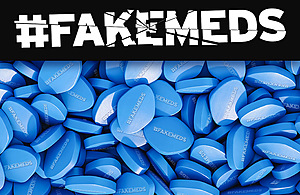New figures show 3.5 million unlicensed erection pills seized in 2019
Around 3.5 million unlicensed erection pills worth more than £10 million were seized in the UK in 2019 according to new figures released today by the Medicines and Healthcare products Regulatory Agency (MHRA).

The MHRA is warning people not to take a chance with fake medicines as it launches the next phase of its #FakeMeds campaign, this time focusing on fake erectile dysfunction (ED) medicines sold online.
Erectile problems in general affect up to 21% of men in the UK, which is equivalent to 4.3 million men in the UK. Despite this, it has been found that 44% of men with ED aged 40 and over have not sought medical help and may be buying fake products online.
Fake ED drugs can lead to more than just a let-down in the bedroom. There is no way of knowing what is in them nor the negative health effects they can have. Whilst it might seem appealing to skip the need for an assessment from a healthcare professional by buying medicines online, men with erectile problems may be putting their health at risk. Fake medicines may not contain any active ingredients, or worse, may contain toxic ingredients which could lead to serious health consequences.
The MHRA’s enforcement team has worked with UK Border Force to seize millions of unlicensed medicines at the border. Often illegal traders pose as legitimate suppliers, selling medications that are unlicensed for the UK market and offering tempting prices lower than the real deal. Since the launch of the #FakeMeds campaign in 2016, the MHRA has been continuing to crack down by closing illegally operating sites selling unlicensed products.
More than half of all medicines and medical devices bought online are fake or counterfeit, highlighting the need for enforcement activity and public awareness to protect and improve the UK’s public health.
With this new phase of #FakeMeds the agency is using the campaign to encourage people who buy medication online to make sure they are purchasing from safe and legitimate sources. It also encourages people to report suspected dodgy ED drugs, and any side effects experienced to the Yellow Card scheme
Mark Jackson, MHRA Head of Enforcement, said:
Fake ED drugs might not give you the result you want or even make you ill. Any medication bought from an unregistered website may be fake and will not meet quality and safety standards. We encourage people not to take a chance with fake medicines – make sure you are buying from a legitimate source.
Visit the #FakeMeds website for tools and resources to help people purchase medication or medical devices safely online. If you have any questions about ED, please speak to a healthcare professional.
Ends
Notes to editor
-
The #FakeMeds campaign is a public health campaign which aims to reduce the harm caused by purchasing fake, unlicensed or counterfeit medical products online. Phase 3 of the #FakeMeds campaign will focus on the issue of fake erectile dysfunction (ED) medicines and raise awareness of the prevalence of fake ED medicines online and encouraging audiences to buy from legitimate sources. Previous phases of the campaign have focused on dodgy diet pills and fake self-testing STI kits. Follow #FakeMeds on Twitter, Facebook and Instagram.
-
The Medicines and Healthcare products Regulatory Agency is responsible for regulating all medicines and medical devices in the UK by ensuring they work and are acceptably safe. All our work is underpinned by robust and fact-based judgements to ensure that the benefits justify any risks.
-
The MHRA is a centre of the Medicines and Healthcare products Regulatory Agency which also includes the National Institute for Biological Standards and Control (NIBSC)and the Clinical Practice Research Datalink (CPRD). The MHRA is an executive agency of the Department of Health and Social Care.
-
The Yellow Card scheme helps the MHRA monitor the safety of all healthcare products in the UK to ensure they are acceptably safe for patients and those that use them.
-
Erectile problems in general affect up to 21% of men in the UK according to Kantar TNS Omnibus Survey Dec 2010 – in a survey of 1,033 men.
-
44% of men with erectile dysfunction (ED) aged 40 and over have not sought medical help according to Opinium for Pfizer: ED market research, February 2018.